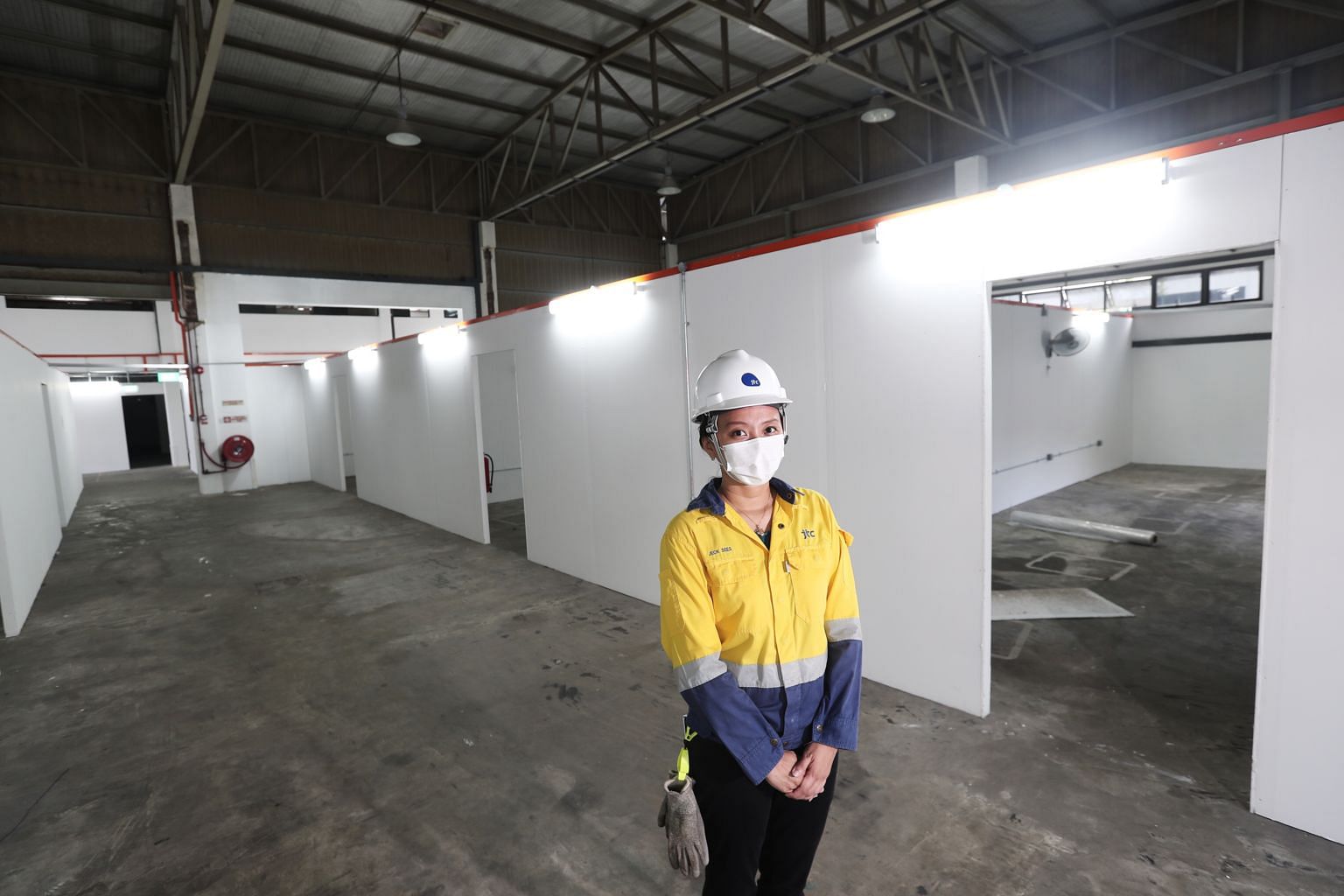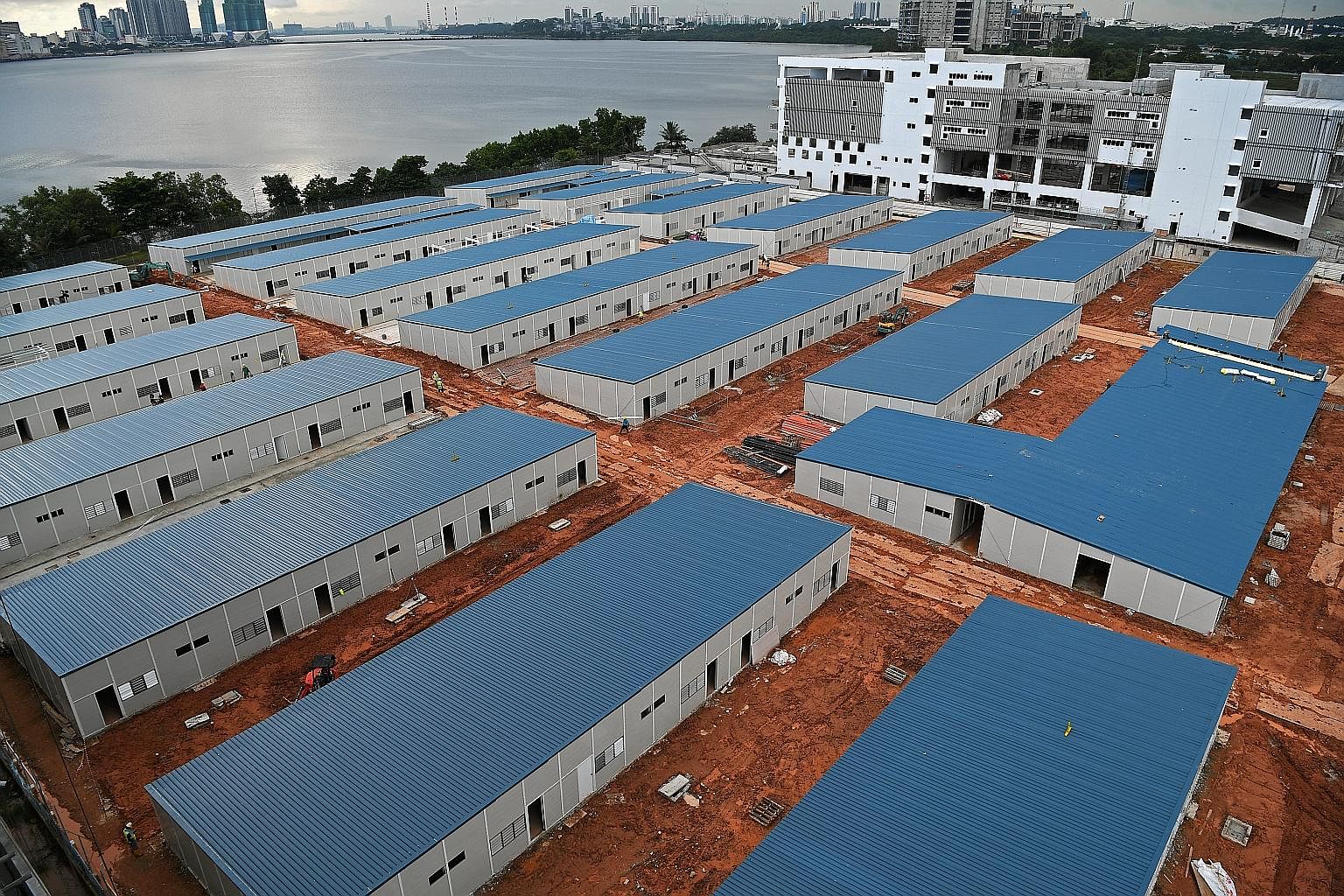Instead of the one or two years that will typically be required for a building project of similar scale, some of the new Quick Build Dormitories (QBDs) announced by the multi-ministry Covid-19 task force can be completed in about three to four months.
To meet this accelerated timeline as part of a whole-of-government effort to rehouse migrant workers and curb the spread of Covid-19, a team of engineers from government agency JTC Corporation had to work late into the night, adjust work processes and think out of the box when it came to designing and planning for the new dorms.
These QBDs will pilot new living standards for worker dormitories, including allocating more living space for each worker, after a spike in Covid-19 cases among workers living at close quarters was detected in April.
This will reduce the risk of similar Covid-19 outbreaks, and enable a quick response should one happen again.
Construction work for the QBDs is being overseen by a number of agencies, including JTC, which is in charge of a few sites, including two in Kranji and Tuas.
Ms Tang Woan Ling, 35, a senior project manager who leads a team of architects, engineers and builders for a 2.5ha QBD site under JTC in Kranji Way, had mixed feelings when she was assigned the project in April.
"I was excited (to be given a chance to) contribute and improve the workers' living conditions, but it was also quite stressful because this is the first time that I am working on a building project," said the engineer, who typically works on infrastructure projects such as roads and drainage networks.
Each resident will have 6 sq m of living space, not including shared facilities, compared with the current 4.5 sq m, which includes shared facilities. Five workers will share a set of toilet facilities, compared with 15 under current rules.
There will be a maximum of 10 beds to a room, with only single-deck beds allowed, spaced at least 1m apart. A typical dorm today has 12 to 16 workers sleeping on double-decker beds per room.
There were also extraordinary circumstances amid the Covid-19 crisis that the team had to contend with, Ms Tang told The Straits Times in an interview last week.
With Malaysia under lockdown at that time, some supplies from the country needed for the dormitories, such as tiles, could not be obtained, Ms Tang recalled.

Given Singapore's circuit breaker measures, which led to most construction work having to be suspended, and the spike in Covid-19 cases in dorms then, the team also had to work closely with the contractors to ensure workers taken on site were healthy and able to get the necessary permits and approvals to work, added Ms Tang.
To make up for the labour shortfall, at least eight or nine site supervisors also took on additional roles as workers on site, she said.
Mr Alan Ong, 46, a principal project manager involved in works at a 2.2ha site in Tuas Avenue 2, which is also under JTC, said that the design and work processes for the QBD also had to be adapted to speed up the project.
For instance, prefabricated materials were used to reduce the time spent on construction as they could be manufactured at another location before being assembled on site.
The dormitory blocks were kept to just one storey each so that the structure could be kept light, without the need for piling works to support a heavier building, Mr Ong said.
He and Ms Tang also worked with contractors to adapt the design of the dorms based on the materials available, while making sure that safety and quality would not be compromised.

The eight QBDs, announced by the task force earlier this month, would be ready for the workers by the end of the year. Work has started for at least three sites.
Collectively, they would provide about 25,000 short-term bed spaces for workers.
Nine vacant factories will also be fitted out to serve as temporary dormitories for workers.
Ms Teo Jeck Sees, 35, a senior project manager, is part of a team of five from JTC tasked with converting a factory at 6 Neythal Road, in Pioneer, into a dormitory, which will also adopt the new standards set out by the task force.
Unlike the QBDs which could be configured to meet the new standards, converting a factory posed a challenge as the external structure was already fixed, said Ms Teo.
"It forced the team to actually think hard and out of the box... We also did everything on our own, as we did not have the luxury of time to hire an external consultant."
For instance, as the building did not have enough toilets and sanitary fittings, Ms Teo and her team brought in additional containers, so that more toilets could be installed to meet the new specifications.

Work on converting the factory - a two-storey building on a 0.5ha site - started in April, and the team is due to finish work on it by the end of this month.
Though it involved many late nights and intense work, especially at the start of the process, Ms Teo said it was worth it. "(Our team) had a common goal in mind - to give the workers better living conditions."
Mr Ong sees his work on the QBD project as a "small contribution" towards the recovery of the construction sector, which had been badly hit by the Covid-19 crisis.
"Many of my contacts have been affected by the situation... as the dormitories will allow workers to be decanted (to reduce the density of the dormitories), the faster we build these dormitories, the faster the industry can recover."

Temporary housing for workers
The new Quick Build Dormitories (QBDs) are temporary structures that can be constructed quite quickly in a modular form with a low density, with each QBD housing about 500 to 1,000 workers per hectare, depending on the site conditions.
They will last for around two to three years. The Straits Times understands that new and existing operators are likely to be invited to run these upcoming dorms.
Eight QBDs will be ready by the end of the year. They are located at:
• Kranji Way
• 1 Tuas Avenue 2
• Tuas South Avenue 10
• Jalan Tukang
• Admiralty Street
• Choa Chu Kang Grove
• Choa Chu Kang Way
• Tampines Industrial Avenue 2
As part of the same plan to provide temporary housing, unused state properties, including former schools and vacant factories, will also be fitted out into dormitories.
In total, the unused state properties will be able to house about 25,000 workers.
There will be 17 former school sites and nine factories that will be used.
The factories are located at:
• 26A Sungei Kadut Street 4
• 11C, 11D, 15A, 15B Tuas Road
• 25 Kranji Loop
• 120, 128, 130, 134, 136, 138 Genting Lane
• 6 Neythal Road
• 105, 164 Gul Circle
• 128 Tuas South Avenue 3
• 28 Ayer Rajah Crescent
• 36 Sungei Kadut Street 1

